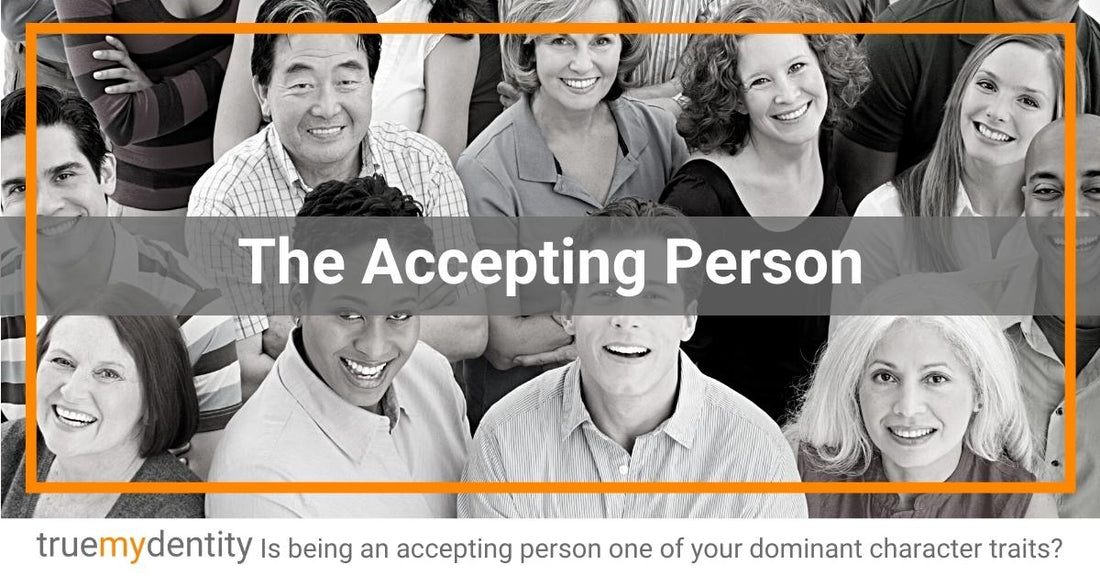
The Accepting Person | How to be More Accepting
Luke FeldbruggeShare
When you're an accepting person, it doesn't just apply to how you treat others, but also how you treat yourself. You can't be considered an accepting individual when you appreciate others around you, but you can't show the same appreciation for yourself. Accepting people, things, and situations isn't a reflection of your complacency, but it's your willingness to allow things, experiences, and people to be exactly as they are. In this article, we cover what it means to be accepting, why the accepting person is important, and why being accepting is a powerful character trait.
Key Takeaways
- Other common characteristics of an accepting person may include: confidence, flexibility, forgiveness, open-mindedness, patience, respect, sensitivity, thoughtfulness, and tolerance.
- Practical tips to become more accepting include: thinking before acting, letting go of things you cannot control, looking at things from a different perspective, and letting yourself (and others) live in the moment.
- True Mydentity's questionnaire can help you identify your most dominant positive character traits, and learn if being accepting is one of your more powerful qualities.
What it Means to be Accepting
What does it mean to be an accepting person? Being accepting goes beyond tolerance; it's about unconditionally allowing people, situations, and oneself to be as they are. It involves embracing differences, letting go things one cannot control, and living in the present moment.
IMPORTANT: If physical or emotional abuse is happening, please find help immediately. Here are some resources to find help:
• Domestic Violence Hotline
• Emotional Abuse Crisis Text Line
• General U.S. hotline resource
Accepting Definition
Merriam-Webster defines ACCEPTING as: able or willing to accept something or someone; inclined to regard something or someone with acceptance rather than with hostility or fear; tending to regard different types of people and ways of life with tolerance and acceptance.
True Mydentity likes to add more muscle to the bones. To be accepting, one must be willing to look past personal perceptions of people, places, things and uncomfortable circumstances to find a level of tolerance and acceptance for what one cannot decide, change or control. People naturally want to control their surroundings to feel secure and comfortable. It takes a confident and brave person with a high level of patience and an open-mind to accept what they cannot control. Instead, one lets it go and accepts it or moves past it. It's not giving in on the possibility of change, but simply letting things and people be as they are. Life is too short to spend it trying to control and shape things that are beyond one’s control.
If you have a little time, complete our questionnaire to find out if accepting is one of your dominant positive characteristics. Otherwise, read on to learn more about what it means to be an accepting person and why it's important.
Why Is It Important To Be Accepting?
Being a more accepting person is one way to find peace, comfort and enjoyment in one's life. One learns to appreciate the present moment in ways that cannot be experienced when one refuses to accept the present moment and the people in it for what it is. An accepting person has the capacity to become mentally and emotionally stronger when dealing with trials and setbacks in life. Most importantly, they ditch the unrealistic expectations of themself and others around them. Over time an accepting person becomes skilled in dealing with frustration, animosity and sadness because they are learning when it is not advantageous or necessary to try and change things out of their control; whether it's a career, personal relationship, or simply the events and happenings in their life. Going against something that doesn’t want to change can cost an enormous amount of time and energy. This is better spent on things you can control; things with value that can lead to positive change in one’s own life or the lives of others.
Importance of Self-Acceptance
An individual's life experiences are commonly driven by one's own self-acceptance. Self-acceptance is an important contributor to feeling secure and confident in who you are, even without external validation from others. Discovering yourself and learning to accept who you are is a life-long journey because a person can change over time (values, beliefs, physically and mentally). This journey helps an individual realize and understand their importance and the value they can offer; while building an acceptance of their positive and more challenging personal qualities. Self-acceptance is important because acceptance from others can be conditional or temporary. Most people you meet throughout your life will eventually move out of it due to the relationship not being a good fit, maybe a big life change (job change, moved), or maybe they pass on. Through all of the wonderful encounters you have with others; you will always have yourself. Therefore, accepting yourself becomes one's foundation of belonging and fitting into the world. Also, it's important to understand that self-acceptance is an ongoing process of discovery and learning. Each person is an ever-evolving work of art continuously changing and growing while adding rings for each year of experience; like the mighty trunk of an oak tree. You are who you are and there's only one of you, so working toward self-acceptance of the good and not so good is one of the most reassuring and rewarding things you can do for yourself.
Get to know yourself better by completing our positive characteristics questionnaire and learn how you rank your own positive characteristics today.
Characteristics of an Accepting Person
CONFIDENT
An accepting person must be confident in one's own self, beliefs and values to accept that other people may feel differently or believe something else and they have every right to feel that way.
FLEXIBLE
The accepting person needs to be flexible because when they accept something it may mean a complete change to what they're currently doing.
FORGIVING
Accepting the actions taken by others may mean forgiving people for hurtful things or mistakes they make.
OPEN-MINDED
Accepting people are often willing to hear other opinions and perspectives that do not necessarily align with their own beliefs and values.
PATIENT
To be an accepting person you must be patient with others. To consider acceptance you must be willing to be with, listen to, learn from, touch, or embrace someone who may not believe or see things the way you do. Therefore, arriving at acceptance can take some patience.
RESPECTFUL
Acceptance is respecting another person for who they are and what they believe, and treating them in a respectful fashion.
SENSITIVE
It's more important to the accepting person to live within the naturally unique and different aspects of people and the world, then to try and change what does not want to change.
THOUGHTFUL
The accepting person is considerate and tries to be understanding toward the beliefs and values of others.
TOLERANT
This is a given. To be accepting, one must be willing to allow for the existence of opinions or beliefs that do not necessarily align with their own.
How to be More Accepting
Think Before You Act
Emotions can be as fast as lightning; leading to emotional outbursts that may not truly reflect what one actually thinks or believes toward an individual or situation. Making assumptions or quick judgements are not always best. Asking questions and intently listening to find the answers for better understanding is a good first step toward acceptance. Generally speaking, most people are not intentionally out to hurt you or negatively impact your life. So, if you find yourself in an uncomfortable situation where something does not align with your beliefs or values, take a step back and realize this person or thing is probably not trying to hurt you. But a good, friendly debate may need to happen!
Let Go
If you're a controlling person, you may need to loosen the reins a bit. That means you need to become more comfortable with being uncomfortable. Your need to control things is so you can feel more comfortable, so you know things are being done to your standards, so you can minimize the risk of setbacks or failure. Hate to break it to you, but most things are beyond your control. Trying to control the uncontrollable can lead to high levels of stress and anxiety. Instead, try to really assess something before attempting to control it. Maybe don’t offer someone tips on how they can improve unless they ask for your advice. Maybe try not to control every aspect of a project at work that involves a team of highly qualified people to do the work. Start letting go of things you know are not entirely in your control.
Change the Perspective
Is there a loved one, friend or grumpy neighbor you wish you could change; more because you want to help improve their life’s situation, or maybe the struggle with their behavior is becoming overwhelming or unbearable? Instead of trying to change the person, maybe a change in perspective is needed. For example, maybe (quietly) assist this person with a few small, but meaningful tasks. This can earn a person’s trust and break down barriers. Be sure to have no expectations of the other person. Simply do small, meaningful things for them here and there without telling them. When they realize it’s you doing these kind things, they may feel a stronger appreciation and respect toward you. When there is no hidden agenda, they may open up to you and allow you to better understand WHY they are the way they are. Really getting to know someone is the key to truly accepting someone. This may not lead to changes in that person, but maybe a change in perspective is what was actually needed. Changing your perspective is far easier than changing a person.
Live in the Moment
As someone becomes more accepting, they also appreciate the present moment. Someone cannot acknowledge and accept the people and things around them if they’re always obsessing over past events or looking toward what their future holds. When one stops to appreciate what surrounds them and what they’re going through at any one particular moment, a person can begin to realize and understand what they can or cannot control. Acceptance of these realizations can be quite liberating and inspiring.
Accepting - True Mydentity Style
True Mydentity offers designs on their clothes that highlight 58 positive human character traits. The powerful accepting trait is one of the 58 character traits featured. If people knew their dominant positive characteristics, and focused time and effort on using them, they would discover they are much more than they thought. Support your powerful character traits. Proclaim the power of your accepting character trait with True Mydentity's comfortable and quality clothing designs.
VIEW ACCEPTING CLOTHING COLLECTION >>
Complete our questionnaire and find out which of the 58 traits are the most dominant for you. Then be sure to check out the clothing offered by True Mydentity and reveal the true you!



